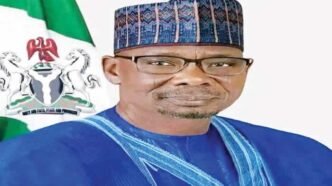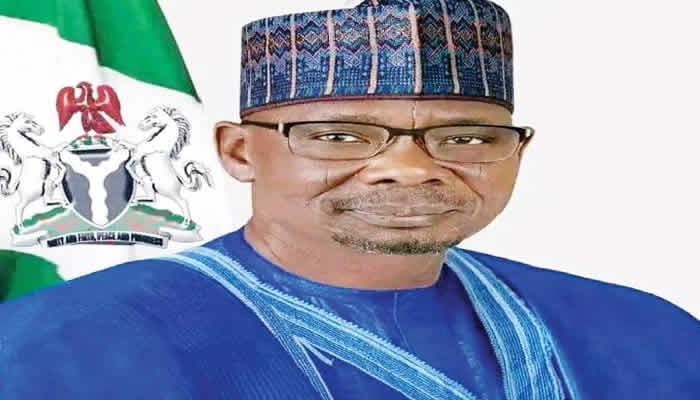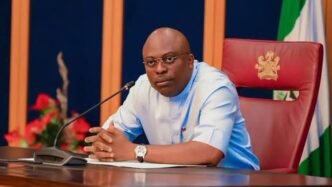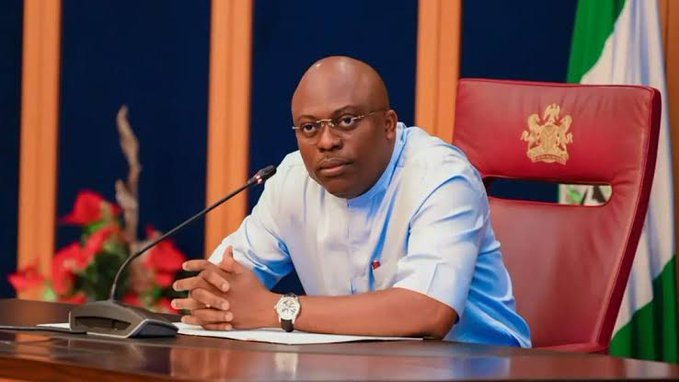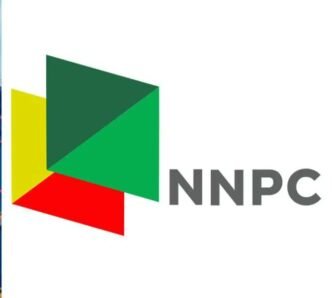The Governor of Nasarawa State, Abdullahi Sule, has urged the National Assembly to establish a special court dedicated solely to handling corruption-related cases in Nigeria.
Governor Sule made the call on Friday during the Passing Out Parade of the Detective Superintendent Cadets Course 10 and Detective Inspector Cadets Course 7 of the Economic and Financial Crimes Commission (EFCC), held at the Nigeria Police Mobile Force Training College, Akwanga, Nasarawa State.
The proposal comes at a time when corruption remains one of Nigeria’s most daunting challenges, hindering economic growth, weakening institutions, and eroding public trust in governance.
Governor Sule’s Position on Anti-Corruption
Addressing the gathering, Governor Sule emphasized that Nigeria’s existing legal and judicial systems are overstretched and often ill-equipped to handle the complex and high-profile cases of corruption that plague the country.
“We must create a special court that will focus exclusively on corruption cases. This will ensure speedy trials, reduce delays in the justice system, and ultimately strengthen the fight against corruption in our nation,” Sule said.
The governor noted that while Nigeria has established specialized anti-corruption agencies such as the EFCC and the Independent Corrupt Practices and Other Related Offences Commission (ICPC), their efforts are often undermined by protracted court proceedings.
According to him, corruption cases sometimes drag on for years, giving room for technicalities and adjournments that frustrate justice delivery. A dedicated court, he argued, would prioritize such cases and ensure that offenders are swiftly held accountable.
The Role of EFCC and Its New Cadets
The event in Akwanga marked the graduation of hundreds of EFCC cadets who underwent rigorous training to strengthen Nigeria’s fight against financial crimes.
Governor Sule commended the EFCC for its resilience, noting that the agency plays a critical role in safeguarding Nigeria’s economic integrity. He urged the newly commissioned officers to uphold professionalism, integrity, and discipline in carrying out their duties.
“You are now foot soldiers in the war against corruption. Nigerians are looking up to you to be different, to be bold, and to pursue justice with honesty. Do not betray the trust placed in you,” he told the cadets.
The governor also expressed optimism that with a dedicated corruption court in place, the efforts of the EFCC and its officers would yield greater results.
Corruption and the Nigerian Judiciary
Governor Sule’s call for a special anti-corruption court resonates with long-standing debates on judicial reforms in Nigeria.
Nigeria’s judiciary is overburdened, handling civil, criminal, electoral, and commercial disputes alongside corruption-related cases. Legal experts have repeatedly argued that this slows down the prosecution of corruption cases, which are often complex and require specialized knowledge in financial crimes.
Statistics show that many high-profile corruption cases involving politically exposed persons and public officials drag on for years without resolution. Some cases collapse entirely due to technical loopholes, lack of diligent prosecution, or delayed judgments.
A specialized corruption court, experts believe, could help eliminate such challenges by assigning trained judges and prosecutors to focus solely on financial crimes, thereby increasing conviction rates and deterring offenders.
Past Efforts to Strengthen Anti-Corruption Prosecution
Governor Sule’s proposal is not the first time Nigeria has considered establishing special courts to address corruption.
In 2017, then Acting President Yemi Osinbajo directed the Chief Justice of Nigeria to designate judges specifically to handle corruption cases. While some progress was made, the system remained within the broader judiciary, meaning delays and adjournments persisted.
Civil society organizations and anti-corruption advocates have consistently called for deeper reforms, including specialized courts, witness protection mechanisms, and increased funding for anti-corruption agencies.
The EFCC, in particular, has long complained about lengthy trials that hinder its work. In some cases, prosecutions have taken over a decade without reaching judgment, undermining public confidence in the justice system.
Stakeholders React to Sule’s Call
Legal practitioners and civil society groups have reacted positively to Governor Sule’s suggestion.
Barrister Gloria Adeyemi, a constitutional lawyer, described the proposal as “timely and practical.”
“Nigeria cannot afford to continue losing the anti-corruption war due to technicalities and judicial bottlenecks. A dedicated court for corruption will bring speed, efficiency, and credibility to the system,” she said.
The Civil Society Legislative Advocacy Centre (CISLAC) also endorsed the idea, noting that it would help reduce the backlog of corruption cases while ensuring specialized attention to financial crime litigation.
However, some skeptics have expressed concern about political interference. They argue that unless the courts are truly independent, they may simply become tools for witch-hunting political opponents rather than dispensing impartial justice.
EFCC’s Broader Mandate and Challenges
The EFCC, since its establishment in 2003, has played a central role in investigating and prosecuting financial crimes, including fraud, embezzlement, money laundering, and cybercrime.
Despite recording some landmark convictions, the agency has often faced criticism for selective prosecution, political interference, and challenges in securing convictions in high-profile cases.
Analysts argue that the creation of a corruption court could significantly strengthen the EFCC’s work by reducing systemic delays and allowing for quicker dispensation of justice.
Governor Sule’s call, therefore, aligns with a broader push for reforms that can enhance the EFCC’s effectiveness.
The Economic Cost of Corruption
Nigeria loses billions of dollars annually to corruption. According to estimates from the Economic and Financial Crimes Commission and the United Nations Office on Drugs and Crime, corruption drains the country of resources that could have been invested in infrastructure, healthcare, education, and job creation.
Governor Sule emphasized that tackling corruption is essential for Nigeria’s economic growth and global reputation.
“No nation can prosper when corruption becomes the order of the day. We must fix our institutions and ensure that justice is swift and uncompromised. That is the only way to restore public trust and attract investment,” he stated.
Looking Ahead: Will the National Assembly Act?
The ball now lies in the court of the National Assembly, which has the constitutional authority to enact legislation establishing special courts.
If passed into law, Nigeria would join other countries such as Kenya, Indonesia, and Pakistan, which have created special courts to tackle corruption cases more efficiently.
Observers say that beyond legislation, strong political will is required to ensure that such courts operate independently, free from political manipulation or undue influence.
Conclusion
Governor Abdullahi Sule’s call for the creation of a special anti-corruption court has reignited discussions about the future of Nigeria’s fight against graft. With corruption continuing to weaken institutions and deprive citizens of development, the idea of a dedicated court offers a promising path toward justice and accountability.
Whether the National Assembly acts on this proposal will determine if Nigeria can finally break the cycle of endless adjournments and unresolved corruption cases. For the newly commissioned EFCC cadets in Akwanga and millions of Nigerians yearning for change, the establishment of such a court could mark a turning point in the nation’s anti-corruption crusade.

